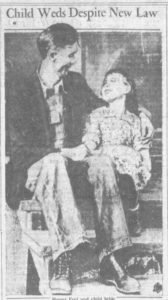
On this day in 1937 Chancellor A. T. Stewart of the Monroe County Chancery Court in Madisonville, Tennessee, denied a petition for annulment.
32 year old Homer Peel of Epperson, dressed in old overalls, appeared in the courtroom with his 12 year old bride, Geneva, to hear the Court announce:
“I believe that society, law and everyone concerned will be better served by the court’s refusing to annul this marriage. There has undoubtedly been a violation of the statute (Tennessee had recently passed a law setting 18 as the minimum age for marriage), but as a social proposition, I can see but one course open to me.”
The Chancellor went on to explain that while he was “unutterably opposed” to this marriage, he couldn’t annul it because to do so would cause the child bride to be put out of house and home with no place to go.
Geneva had been living with her mother, Annie Hamby, in the county poorhouse, then in an orphanage prior to the marriage. She had also lived for a time with Mr. Peel’s brother’s family, which is where she met Homer Peel.
Mrs. Hamby was the one who initiated the annulment lawsuit.
The day before Mr. Peel arrived to the court as ordered but without his wife. Judge Stewart ordered the sheriff to retrieve Geneva and bring her to court the next day, but she refused to do so until she was promised a “pretty new hat.”
The whole affair brought on an intense amount of media coverage, which irritated Mr. Peel. He told photographers at the courthouse to “quit this picture taking if you ain’t a going to pay for it.”
The law prohibiting child marriages was passed due to the storm of protest around the nation caused by the marriage of 9-year old Eunice Winstead and 22-year old Charley Johns in Hancock County.

